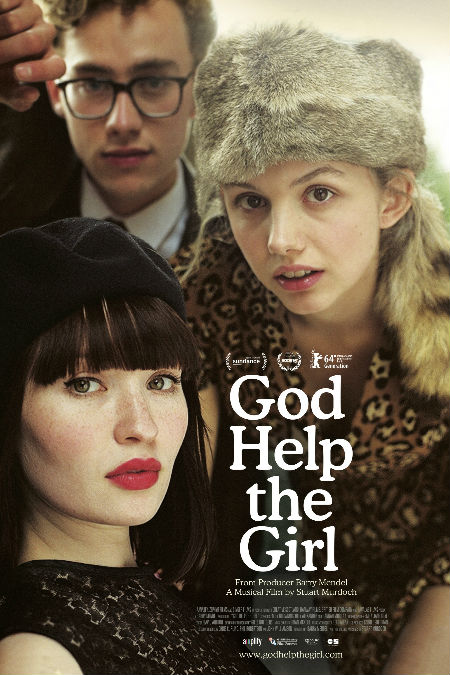
It was Maria von Trapp herself, the woman whose life story inspired the musical The Sound of Music and who is featured in passing as a sweet visual joke in God Help the Girl, who remarked that “Music acts like a magic key, to which the most tightly closed heart opens.”
Its pertinence to God Help the Girl, the first feature film both written and directed by Stuart Murdoch of whimsically indie pop group Belle and Sebastian, lies in the fact that music, also penned by Murdoch, is key to everything that happens in this coming of age, of ambition and of flowering self-awareness film.
Wafer-thin though it might be plot-wise – though to be fair which musicals aren’t, a great many of them possessing a transformative ability to move our souls nonetheless – its real power lies in its celebration of music’s power to alter the otherwise desperate direction of people’s lives, opening hearts to greater or lesser degrees along the way.
In this case, it is that of Eve (Australian Emily Browning in charming form) who, escaping repeatedly from a psychiatric facility where she is being treated for anorexia nervosa, finds herself on the romantically-presented streets of Glasgow – cinematographer Giles Nuttgens winningly bathes the city in the sort of delicately light-washed hues normally reserved for Paris – alone and with little to her name saving a burning desire to make some music that will mean something.
In her mind this kind of meaning comes most strongly from the public popularity contest that are the music charts whose traditional gatekeepers, though increasingly not to the degree they were a couple of decades back, the radio, holds the key to achieving her dream.
But apart from the idea of dropping of a cassette, yes a cassette, of her songs to some radio DJs she listens to whose banter fill many of the hours she spends lying on her bed lost in her own darkly pensive thoughts, she is unsure of where to channel all her musical ambition, her indecision bringing her to a concert of up-and-coming Glaswegian bands where she meets the introverted, kindhearted but opinionated James (Olly Alexander) who offers her a place to sleep, friendship and ultimately a concrete sense of where to head next.
Before Eve disappears into the sunset, there are further friendships to be forged, most notably with the winsome Cass (Hannah Murray), who appears to exist in an altogether alternate universe where daydreaming and an appealing disconnection from the pressing concerns of life fill her days, and a pop group to be formed since as James, never short of an opinion makes clear, “If you want to hear your voice floating in the middle of a beautiful tapestry of frequencies… you’re gonna need a pop group.”
While Eve and James, who pretty much from the moment he spies a despondent Eve sitting on the backstairs of the concert hall, is not-so-secretly in love with her, don’t always see eye-to-eye on everything – he the musical purist who sees it as art, a divine calling of sorts primarily while she regards it as a vocation, a concrete thing to be cajoled into being – they do share a deep and abiding love of music, with its expression filling much of their time.
This is fortunate of course since it gives Murdoch the excuse to fill God Help the Girl, with songs and parts of songs aplenty, handy in a movie which is both a musical and a melancholic rumination on the confronting of your demons in the hope that angels, preferably ones with successful music careers, are hovering just behind.
Countering head-on the musical conceit which sees people breaking into perfectly-choreographed routines and songs that minutes before were unknown to them, Murdoch has Eve and James remark, in one scene in particular, on the innate silliness of singing to someone like you’re in a staged production number when all you’re really doing is lying around in a small-ish bedsit musing on life and the dreams which underpin them.
Full to the brim of scenes both Dickensian-lite and musically fey, God Help the Girl largely does a fine job of balancing the grimness of Eve’s often-hidden torment – she is spry and girlishly playful in company; morosely thoughtful in the safety of her own room – and the almost surreal, fairytale-fun of the songs which are presented with all the delightful camp we have come to expect from musicals.
It’s a risky gambit since either sensibility could have muddied or obscured the other, or worse still created a schizophrenically-split beast that was both giddily charming and intensely bleak and a mess to behold, but it works thanks to the gorgeously-wrought pop songs, the fine performances throughout – Alexander particularly charmingly delivers opinionated lines which otherwise could have cast him as a full-of-himself prat – and a sensibility that suggests being suspended between the harshness of life, and the dreams or aspirations that will soften its spiky, disconcerting edges.
God Help the Girl, though twee in parts and artfully self-aware in others, is a refreshingly original take – this applies to the ending too which does not play out as you expect it to but rather as it needs to – on the business of figuring out where you want to be in life and what matters to you when you’re there, a meditation on the basic need that everyone has to find meaning somewhere, no matter how varied its expression might be.